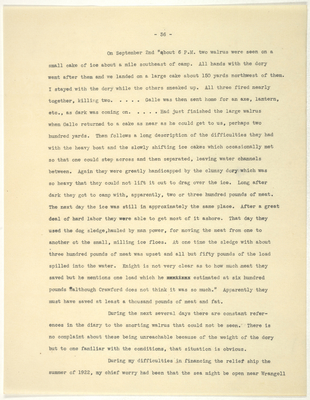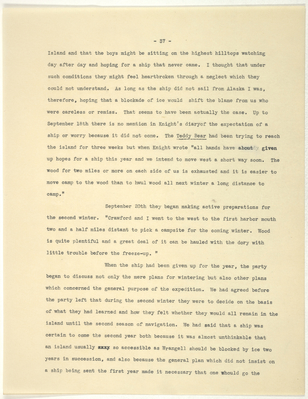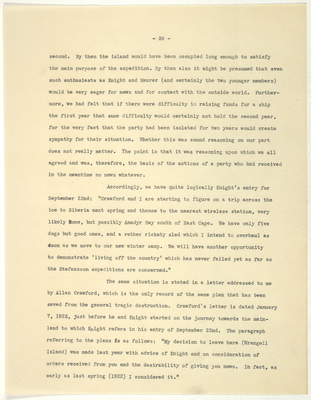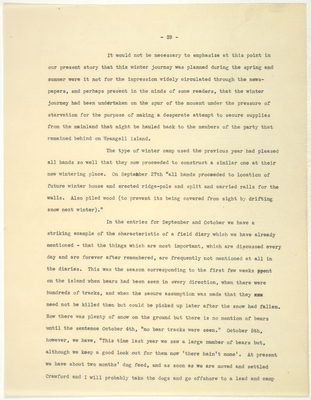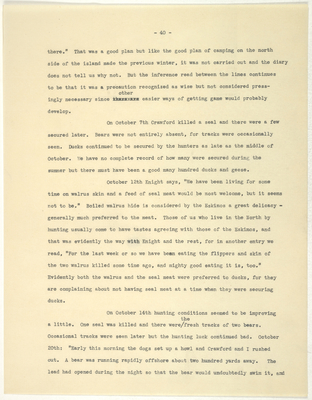Pages
stefansson-wrangel-09-25-006-036
- 36 -
On September 2nd "about 6 P.M. two walrus were seen on a small cake of ice about a mile southeast of camp. All hands with the dory went after them and we landed on a large cake about 150 yards northwest of them. I stayed with the dory while the others sneaked up. All three fired nearly together, killing two. .... Galle was then sent home for an axe, lantern, etc. , as dark was coming on. ... Had just finished the large walrus when Galle returned to a cake as near as he could get to us, perhaps two hundred yards. Then follows a long description of the difficulties they had with the heavy boat and the slowly shifting ice cakes which occationally met so that one could step across and separated, leaving water channels between. Again they were greatley handicapped by the clumsy dory which was so heavy that they could not lift it out to drag over the ice. Long after dark they got to camp with, apparently, two or three hundred pounds of meat. The next day the ice was still in approximatley the same place. After a great deal of hard labour they were able to get most of it ahsore. That day they used ot the small, milling ice floes. At one time the sledge with about three hundred pounds of meat was upset and all but fifty pounds of the load spilled into the water. Knight is not very clear as to how much meat they saved but he mentions one load which he XXXXXXXX estimated at six hundred pounds although Crawford does not think it was so much." Apparently they must have saved at least a thousand pounds of meat and fat.
During the next several days there are constant references in the diary to the snorting walrus that could not be seen. There is no complaint about these being unreachable because of the weight of the dory but to one familiar with the conditions, that situation is obvious.
During my difficulties in financing the relief ship the summer of 1922, my cheif worry had been that the sea might be open near Wrangell
stefansson-wrangel-09-25-006-037
- 37 -
Island and that the boys might be sitting on the highest hilltops watching day after day and hoping for a ship that never came. I thought that under such conditions they might feel heartbroken through a neglect which they could not understand. As long as the ship did not sail from Alaska I was, therefore, hoping that a blockade of ice would shift the blame from us who were careless or remiss. That seems to have been actually the case. Up to September 18th there is no mention in Knight's diaryof the expectation of a ship or worry because, it did not come. The [Teddy Bear] had been trying to reach the island for three weeks but when Knight wrote "all hands have about given up hopes for a ship this year and we intend to move west a short way soon. The wood for two miles or more on each side of us is exhausted and it is easier to move camp to the wood than to hwul wood all next winter a long distance to camp."
September 20th they began making active preparations for the second winter. "Crawford and I went to the west to the first harbor mouth two and a half miles distant to pick a campsite for the coming winter. Wood is quite plentiful and a great deal of it can be hauled with the dory with little trouble before the freeze-up. "
When the ship had been given up for the year, the party began to discuss not only the mere plans for wintering but also other plans which concerned the general purpose of the expedition. We had agreed before the party left that during the second winter they were to decide on the basis of what they had learned and how they felt whether they would all remain in the island until the second season of navigation. We had said that a ship was certain to come the second year both because it was almost unthinkable that an island usually xxxx so accessible as Wrangell should be blocked by ice two years in succession, and also because the general plan which did not insist on a ship being sent the first year made it necessary that one should go the
stefansson-wrangel-09-25-006-038
- 38 -
second. By then the island would have been occupied long enough to satisfy the main purpose of the expedition. By then also it might be presumed that even such enthusiasts as Knight and Maurer (and certainly the two younger members) would be very eager for news and for contact with the outside world. Furthermore, we had felt that if there were difficulty in raising funds for a ship the first year that same difficulty would certainly not hold the second year, for the very fact that the party had been isolated for two years would create sympathy for their situation. Whether this was sound reasoning on our part does not really matter. The point is that it was reasoning upon which we all agreed and was, therefore, the basis of the actions of a party who had received in the meantime no news whatever.
Accordingly, we have quite logically Knight’s entry for September 22nd: "Crawford and I are starting to figure on a trip across the ice to Siberia next spring and thence to the nearest wireless station, very likely Nome, but possibly Anadyr Bay south of East Cape. We have only five dogs but good ones, and a rather rickety sled which I intend to overhaul as soon as we move to our new winter camp. We will have another opportunity to demonstrate 'living off the country' which has never failed yet as far as the Stefansson expeditions are concerned."
The same situation is stated in a letter addressed to me by Allan Crawford, which is the only record of the same plan that has been saved from the general tragic destruction. Crawford's letter is dated , just before he and Knight started on the journey towards the mainland to which Knight refers in his entry of September 22nd. The paragraph referring to the plans fs as follows; "My decision to leave here (Wrangell Island) was made last year with advice of Knight and on consideration of orders received from you and the desirability of giving you news. In fact, as early as last spring (1922) I considered it.”
stefansson-wrangel-09-25-006-039
- 39 -
It would not be necessary to emphasize at this point in our present story that this winter journey was planned during the spring and summer were it not for the impression widely circulated through the newspapers, and perhaps present in the minds of some readers, that the winter journey had been undertaken on the spur of the moment under the pressure of starvation for the purpose of making a desperate attempt to secure supplies from the mainland that might be hauled back to the members of the party that remained behind on Wrangell Island,
The type of winter camp used the previous year had pleased all hands so well that they now proceeded to construct a similar one at their new wintering place. On September 27th "all hands proceeded to location of future winter house and erected ridge-pole and split and carried rails for the walls. Also piled wood (to prevent its being covered from sight by drifting snow next winter)."
In the entries for September and October we have a striking example of the characteristic of a field diary which we have already mentioned - that the things which are most important, which are discussed every day and are forever after remembered, are frequently not mentioned at all in the diaries. This was the season corresponding to the first few weeks spent on the island when bears had been seen in every direction, when there were hundreds of tracks, and when the secure assumption was made that they xxx need not be killed then but could be picked up later after the snow had fallen. Now there was plenty of snow on the ground but there is no mention of bears until the sentence October 4th, "no bear tracks were seen.” October 5th, however, we have, "This time last year we saw a large number of bears but, although we keep a good look out for them now 'there hain't none'. At present we have about two months' dog feed, and as soon as we are moved and settled Crawford and i will probably take the dogs and go offshore to a lead and camp
stefansson-wrangel-09-25-006-040
- 40 -
there." That was a good plan but like the good plan of camping on the north side of the island made the previous winter, it was not carried out and the diary does not tell us why not. But the inference read between the lines continues to be that it was a precaution recognized as wise but not considered pressingly necessary since other easier ways of getting game would probably develop.
On October 7th Crawford killed a seal and there were a few secured later. Bears were not entirely absent, for tracks were occasionally seen. Ducks continued to be secured by the hunters as late as the middle of October. We have no complete record of how many were secured during the summer but there must have been a good many hundred ducks and geese.
October 12th Knight says, "We have been living for some time on walrus skin and a feed of seal meat would be most welcome, but it seems not to be." Boiled walrus hide is considered by the Eskimos a great delicacy - generally much preferred to the meat. Those of us who live in the North by hunting usually come to have tastes agreeing with those of the Eskimos, and that was evidently the way with Knight and the rest, for in another entry we read, "For the last week or so we have bean eating the flippers and skin of the two walrus killed some time ago, and mighty good eating it is, too." Evidently both the walrus and the seal meat were preferred to ducks, for they are complaining about not having seal meat at a time when they were securing ducks.
On October 14th hunting conditions seemed to be improving a little. One seal was killed and there were the fresh tracks of two bears. Occasional tracks were seen later but the hunting luck continued bad. October 20th: "Early this morning the dogs set up a howl and Crawford and I rushed out. A bear was running rapidly offshore about two hundred yards away. The lead had opened during the night so that the bear would undoubtedly swim it, and
